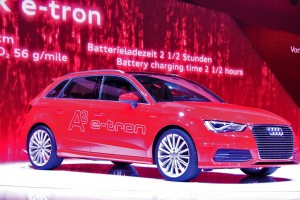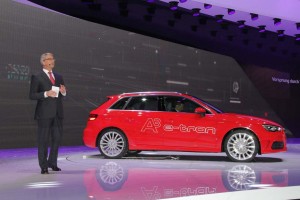Luxury automaker Audi has taken the first step in what it promises will be a major commitment to plug-in hybrid powertrain technology.
The new Audi A3 Sportback e-tron making its public debut at this week’s Geneva Motor Show is being billed as the first in a procession of clean, high-mileage PHEVs the Volkswagen AG luxury subsidiary plans to roll out over the coming years. It marks a shift away from Audi’s earlier interest in pure battery-electric technology, company officials insisting plug-ins better meet the needs of today’s motorists.
Using the most sporty of the compact Audi A3 body styles, the new e-tron offers “the power of two hearts,” proclaimed Rupert Stadler, Audi’s CEO, during a Geneva news conference. There’s a 150-horsepower turbocharged 1.4-liter inline-four gasoline engine paired with a 100-horsepower electric motor.
The system’s 8.8 kilowatt-hour lithium-ion powerpack will yield slightly more than 30 miles of range in electric-only mode – about 20% less than the Chevrolet Volt but more than twice as much as the Toyota Prius plug-in. In conventional hybrid mode, however, range with a single tank of fuel jumps to around 600 miles. The maker hasn’t yet issued a final fuel-economy number, but it claims the plug-in wagon will produce as little as 35 grams of CO2 per kilometer, or barely a third of the current European emissions target.
Charging, meanwhile, takes as little as 2.5 hours using a 240-volt quick charger, officials revealed. Audi doesn’t favor the super-fast 480-volt DC system, like Tesla’s so-called “Supercharger stations,” because of the potential to reduce battery life.
Audi has been working on its electrification strategy for about a half decade, first showing off a pure battery-electric version of its R8 supercar in late 2009. It wasn’t alone, Mercedes-Benz following with a battery-powered variant of the SLS 2-seater that is just now going on sale.
But while Heinz Hollerweger, Audi AG’s head of technical development, calls the R8 an important “learning project,” he quickly became convinced that “battery-only vehicles give up too much in range” to appeal to more than a narrow niche audience.
On the other hand, he said, during a conversation following Audi’s Geneva news conference, “I’m convinced” that plug-ins, by effectively overcoming the battery range issue, will eventually become much more mainstream.
When General Motors began developing the Volt its research suggested the majority of commuters would have more than enough battery power to handle a typical day’s drive. Audi expects much the same with the e-Tron. But for the occasional vacation or weekend drive, motorists won’t have to worry about limited range – or the lack of a public charging infrastructure, something even the industry’s biggest EV proponents, like Nissan/Renault CEO Carlos Ghosn admit being a serious challenge.
The push for electrification is driven by a variety of factors. There is a growing consumer interest in environmentally friendly vehicles, but there also is the rapid tightening of emissions standards. Not only do manufacturers like Audi face higher mileage mandates in the U.S. and lower CO2 rules in Europe, but a number of cities are considering rules that could ban motorists operating on internal combustion power from entering central cities.
The A3 e-Tron permits a driver to select when to choose gas, hybrid or battery mode so, for example, a commuter might wait until reaching a downtown London or Paris to go into fully electric operation.
There are some downsides, the combination of two sophisticated drive systems adding significantly to vehicle cost. Audi is hoping that its more upscale buyers will be more willing to accept that premium compared to customers considering more mainstream models like the Chevrolet Volt.
That’s a big bet but a critical one considering, “We plan to add one more (plug-in) per year,” said Hollerweger.
The maker is also looking at even more fuel-efficient variants, such as a diesel-electric plug-in, which the technical chief confirmed, “We are planning.” It will almost certainly take a different approach than the diesel-electric drivetrain going into parent Volkswagen AG’s new VW XL1, a super-aerodynamic new model that it claims will deliver over 260 mpg.
At Audi, the challenge is balancing mileage and low emissions against sporty performance. The good news for the maker is that electric motors are actually quite peppy, producing almost instant torque, which is what gives a vehicle that instant launch feel. Of course, there is a trade-off between aggressive acceleration and battery range.
The fact that you can tune an electric drive system to balance performance and fuel economy is something that works particularly well in the Volkswagen empire, with its 12 different brands. Each will take a very different approach but most, if not all, will be adding plug-ins over the next few years, even ultra-premium Bentley, which confirmed it will have an optional PHEV for the new luxury SUV it will launch in 2015.
In less exclusive offerings, these “will be volume cars” promised Ulrich Hackenberg, the VWAG board member overseeing technical development.
And they will not be limited to select markets. The Audi A3 e-Tron will go on sale for 2014 in Europe and a U.S. version will follow, according to Hackenberg, though likely in a sedan, rather than the Sportback body.



Hybrids are far more practical than EVs but I doubt the cost of a good hybrid can be justified based on reduced emissions and higher mpg, other than by a tree hugger…